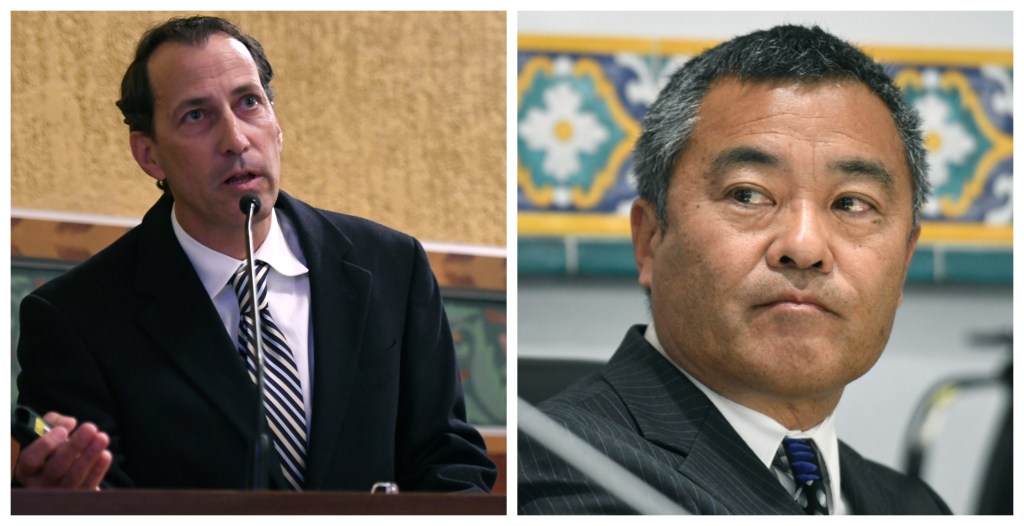Even if former San Marcos High School principal Edward Behrens was thrown under the bus two years ago when district administrators demoted him to a junior high school teacher, his due process rights were not violated; that, in a nutshell, is the opinion of an appellate court panel of three judges issued this week.
Whether this brings to a close Behrens’s tortured legal fight to clear his name and collect back pay for the $50,000-a-year reduction in salary he experienced has yet to be seen, but in light of this ruling, the road ahead for the former principal — who emerged as a lightning rod in the district’s ongoing cultural warfare about equity and access — is far from inviting. The opinion, however, does substantiate Behrens’s allegation that former Santa Barbara Unified School District superintendent Cary Matsuoka presented false information to the local media that cast Behrens in an undeniably unflattering light.
Behrens was demoted as San Marcos principal amid the public furor that erupted in January 2018 over a private chat room run by several male San Marcos students — with at least one wielding a musket — making sexually disparaging remarks about females in general and brandishing the term “THOTs”, for example, which is short for “Those Hos Over There.” They also made remarks threatening physical violence against specific girls attending San Marcos. The chat room attendees were all white. Some of the students about whom they spoke were Latinx. The Sheriff’s Office concluded there was no real threat to the students named or the school itself, but there was widespread frustration and anger over how clumsily the incident was reported to San Marcos parents, who were trying to calibrate how alarmed they should be on behalf of their children, and to the public at large.
Get the top stories in your inbox by signing up for our daily newsletter, Indy Today.
On March 13, 2018, the district school board voted 4-1 to remove Behrens as principal of San Marcos — a post he’d held for seven years — at the urging of superintendent Matsuoka. Matsuoka would later accuse Behrens in the media of not notifying district administrators of the incident for four days, thus contributing to the confusion. “This one is a big deal,” he told reporter Jerry Roberts at the time. But when deposed under oath by Behrens’s attorneys, Matsuoka would concede Behrens had, in fact, notified district administrators the same day he learned of it, on January 19. “There was not a four-day delay in informing the District,” the panel of judges wrote, adding, “Matsuoka’s statement to that effect was not corrected by the District.”
At an April 10 meeting with San Marcos parents, Matsuoka would tell parents that Behrens had been reassigned to ensure “equal access,” explaining how, the court wrote, “he would focus on the ‘equity issue’ in choosing the next principal.’” In an email to a concerned parent, school boardmember Jackie Reid would defend her vote to demote Behrens, writing that she “truly believed in the importance of ensuring that ALL students have access to the curriculum and the ability to achieve educational success.”
Behrens sued to get his job back. He argued that he had been unfairly tarred as an incompetent and a racist without being allowed to respond to the charges. In court papers, he said he had not been given the detailed explanation for his reassignment that California’s education code required; he had been denied access to the memo Matsuoka prepared for the school board when they voted to demote him; and he had not been given an adequate opportunity to rebut those charges. He demanded that he be given his job back and made whole for the loss of pay he suffered.
Santa Barbara Superior Court Judge Pauline Maxwell rejected all these arguments, arguing the district did not need to cite specific reasons to reassign Behrens. So, too, did the Court of Appeal. In short, the appeals court ruled that state law does not require Behrens — or any high school principal reassigned to a teaching position — be given a detailed explanation, just that he be given an explanation. And Matsuoka did just that, the panel of judges concluded, when the superintendent wrote that “a change of leadership” would be in the school’s best interest.
While the court concluded Behrens had, in fact, been denied access to the memo that school boardmembers relied upon when voting to demote him, the judges noted that all the information in that memo could be found in Behrens’s personnel file and that Behrens had been given that. Behrens, the court found, “had access to, and the opportunity to respond to all the documents on which the memo was based.”
In addition, the court noted, Behrens had addressed the school board at some length prior to his demotion, making the case why he deserved to keep his job and how the school community would suffer if he were removed from his post. In that address, Behrens detailed how under his tenure at San Marcos, the school’s dropout rate had declined, its graduation rate had increased, and more English-language learners had met the district’s language arts standards. He predicted that attendance would drop if he were demoted, as would the level of parental engagement. About 50 members of the public also spoke on Behrens’s behalf, the court noted.
The board would vote 4-1 to demote Behrens. Boardmember Laura Capps cast the sole dissenting vote. This marks the fourth legal defeat Behrens has suffered. He is currently assigned to Santa Barbara Junior High School, where he teaches history.

